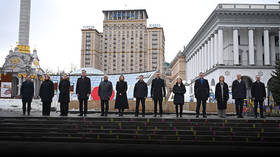Tracking everywhere: Private companies offer worldwide spying tools

Virtually all cell phones on Earth can be geographically pinpointed with the right technology, a new report suggests, and the tools that enable this tracking are becoming increasingly all too affordable.
Products that can locate a handhold phone within a city block from any corner of the globe are nothing new — the intelligence documents disclosed by former United States government contractor Edward Snowden last year have proved that the US National Security Agency is in the business of not just finding cellphones, but eavesdropping on those call and sometimes even infecting those devices.
According to a report published this Monday in the Washington Post, however, governments around the globe no longer need entities like the NSA or its British counterpart, the GCHQ, to carry out some of these operations. Post journalist Craig Timberg wrote this week that a method of surveillance that allows a targeted device to be located from thousands of miles away is cheaper than ever, and it poses a problem for the privacy of people the world over.
“The technology works by exploiting an essential fact of all cellular networks: They must keep detailed, up-to-the-minute records on the locations of their customers to deliver calls and other services to them,” Timberg wrote. “Surveillance systems are secretly collecting these records to map people’s travels over days, weeks or longer, according to company marketing documents and experts in surveillance technology.”
According to Timberg's report, systems currently exist that allow exploiting this vulnerability to be easier than ever. Once a government or agency has paid for the proper system, all they have to do is type a phone number into specialized software and then wait while the computer scours location data being collected by cellular carriers and then delivered an address: within a block in most urban areas, Timberg wrote, or within a mile in the middle of nowhere.
“This rapid spread underscores how the burgeoning, multibillion-dollar surveillance industry makes advanced spying technology available worldwide,” he wrote.
To privacy advocates, this isn't a good thing.
“Any tin-pot dictator with enough money to buy the system could spy on people anywhere in the world,” Eric King, the deputy director of Privacy International, a London-based activist group, told the Post. “This is a huge problem.”
“If this is technically possible, why couldn’t anybody do this anywhere?” added Jon Peha, a former White House scientific adviser. “I’m worried about foreign governments, and I’m even more worried about non-governments,” Peha said. “Which is not to say I’d be happy about the NSA using this method to collect location data. But better them than the Iranians.”
But according to the Post, nations the world over are getting their hands on these tools in increasing numbers, and even the whereabouts of Americans in the US can be identified at the drop of a hat by a security agency half the world over. One company that offers such services, Verint, advertises on its website that targets can be tracked in locales including Mexico, Nigeria, South Africa, Brazil, Congo, the United Arab Emirates and Zimbabwe, among others, according to the Post, and systems sold out of Switzerland and Ukraine appear to offer tools to track devices in the US and Israel when other companies won't.
“You’re obviously trackable from all over the planet if you have a cellphone with you, as long as it’s turned on,” Berlin-based telecommunications security researcher Tobias Engel told the Post. “It’s possible for almost anyone to track you as long as they are willing to spend some money on it.”














